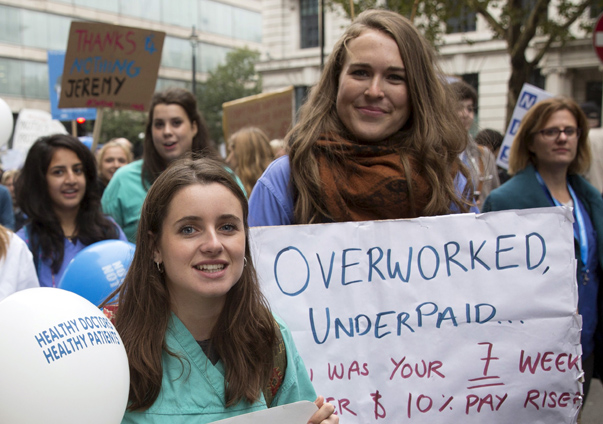“Junior doctors have condemned Jeremy Hunt’s ‘terrifying’ offer of an 11 per cent pay rise as a ‘cynical attempt’ to ‘manipulate the figures’ – and claimed the raise will be a pay cut in real terms of 26 per cent.”
Independent, 4 November 2015
The background
Are junior doctors in line for a pay cut? That’s certainly what the papers are reporting today, after Health Secretary Jeremy Hunt wrote to junior doctors laying out the government’s offer on pay and conditions for trainees.
Junior doctors are being offered an 11 per cent rise in their basic salary, in exchange for being available for more evening and weekend work without overtime.
But many media reports are quoting junior doctors who cast doubt over whether this is really a pay rise, or whether Mr Hunt is trying to pull a fast one. Who’s right?
The analysis
Jeremy Hunt’s Department of Health has been at loggerheads with the doctors’ trade union, the British Medical Association (BMA), over changes to contracts for junior doctors.
The BMA is asking members to vote on industrial action from tomorrow, but perhaps in a bid to avoid any fireworks, Mr Hunt has made a last-minute offer to England’s 50,000 or so junior doctors to convince them the government is putting a fair deal on the table.
As with every industrial dispute since the builders of Stonehenge downed tools, both sides claim they have always been open to talks and it’s the opposition who are peevishly refusing to resolve the deadlock.
The government’s offer is pretty complex but there are a few headlines:
* An increase in the “standard” hours doctors are expected to work before getting overtime, up from 60 hours a week to 87 hours, in an effort to move to a “seven-day” NHS.
We’ve FactChecked the claim that more patients die at weekends under the existing system here.
* An 11 per cent rise in basic pay, so a newly-qualified doctor will receive £25,500 instead of £22,636 and someone in the final stage of training will get £55,000 instead of £47,175.
It has been reported that this is less than a minimum rise of 14.9 per cent recommended by the independent Review Body on Doctors’ and Dentists’ Remuneration to make up for the cut in overtime hours.
But this isn’t strictly accurate. The scenario the panel endorsed was a 14.9 per cent rise in basic pay to offset an increase in “standard time” to 90 hours a week.
In today’s offer, we are talking about 87 hours a week before overtime and a less generous pay hike.
* An end to automatic pay rises for junior doctors. Pay will be based on more responsibility rather than time served.
This is arguably fairer for those who get promoted more quickly but bad for others, like doctors who take time off for parental leave.
* New limits on working hours, including a maximum of 72 hours a week instead of 91 and a max of four night shifts in a row.
Scorn has been heaped upon the suggestion that doctors really will get a pay rise, but the government’s offer comes with a pay calculator allowing medics to put in their shift details and see if they will win or lose.
As far as we can see, no one will lose immediately because the government is offering “pay protection” for anyone who would potentially see their pay cut thanks to the changes.
Mr Hunt says about three quarters of junior doctors will get a net raise, while about 500 (roughly one per cent) will lose out because they are currently working illegally long hours and that practice will end with the new contract.
The newspapers are full of quotes from junior doctors disputing all this, but it’s not clear that the scenarios take in today’s offer of pay protection, and we are not told whether the claims from the doctors have been checked with the pay calculator.
The BMA has in fact offered a cautious welcome to the assurance that no trainee working legal hours will have their pay cut as a potential “step in the right direction”.
We should note though, that the promise to protect current pay only lasts until 2019, and we don’t know what will happen after that.
The verdict
Ironically, given that we are talking about medicine, this is a story dogged by anecdotal rather than scientific evidence.
Any number of newspaper stories allege that Britain is haemhorraging junior doctors – who are apparently heading to Australia in droves thanks to the government’s attempt at changing working hours.
But we can’t find any database that actually proves whether doctors are actually physically leaving the UK in greater numbers than at any other time.
Similarly, claims that junior doctors are going to suffer a real-terms pay cut are hard to stand up.
There’s no dispute that doctors have a genuine grievance here over work/life balance. They fear that a new contract is about to be forced on them that will mean they could work more unsociable hours for no extra pay.
And there are many other sticking points. Despite the cut in the overall upper limit of hours doctors will be able to work a week, the BMA insists patient safety could be compromised if they are made to work at unsociable times.
But the government does appear to have moved to rule out a pay cut – at least until 2019.
We’ll be very happy to update this if any junior doctors working within the hours limits want to get in touch and prove that their pay will fall, but for now it’s a “fiction”.







